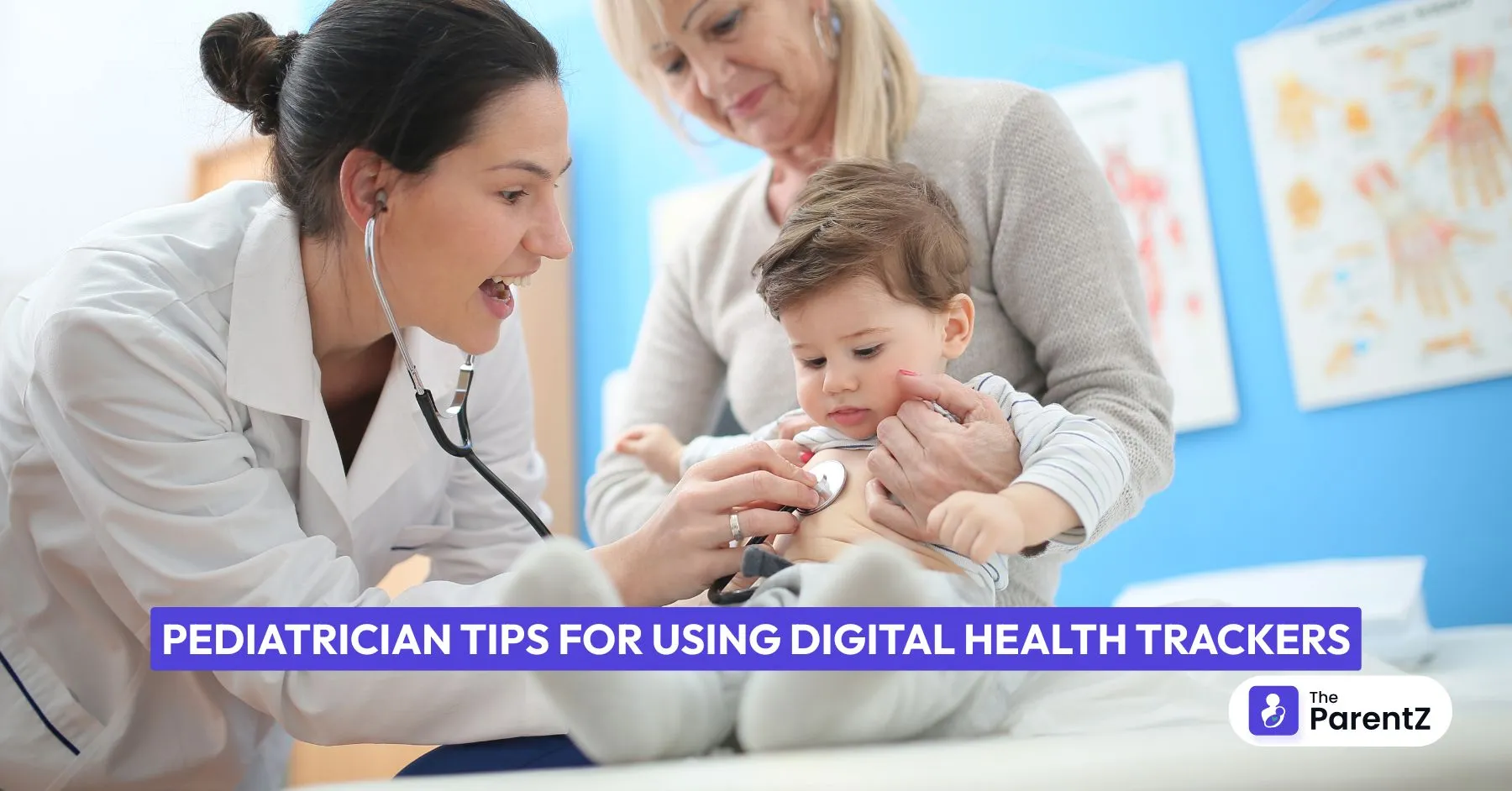For today’s parents, digital health trackers have become invaluable allies in caring for children from birth through adolescence. If this is the first time hearing about digital health trackers, these tools are designed to help, not complicate life. When used thoughtfully, they can make a real difference in a child’s health and a parent’s peace of mind.
Why Digital Health Trackers Matter
Children grow and change rapidly. From feeding and diaper changes in infancy to vaccinations, checkups, and developmental milestones, there’s a lot to remember. Digital health trackers like The ParentZ Child Health and Growth Tracker App are designed to:
- Organize health data in one secure place
- Send reminders for medications, feeds, and appointments
- Track growth and milestones with visual tools
- Help communicate better with pediatricians
Without these tools, it’s easy to forget a dose, miss a checkup, or lose track of important milestones, potentially impacting a child’s health.
Pediatrician-Recommended Tips for Using Digital Health Trackers
1. Prioritize Simplicity and Usability
Many parents abandon digital trackers because they find the interface confusing or the manual data entry tedious. Studies show that unclear instructions, confusing interfaces, and device malfunctions are leading reasons for inaccurate data and user frustration.
Tip:
- Choose apps with intuitive layouts and clear instructions.
- Start with basic features—like logging feeds or medications—before exploring advanced options.
- If you get stuck, seek out video tutorials or ask your pediatrician for a demo.
Warning: If the app feels overwhelming, you’re less likely to use it consistently, which means missing out on the benefits of tracking.
2. Be Mindful of Notification Overload
Too many reminders or alerts can quickly become overwhelming, leading to stress or “alert fatigue,” where you start ignoring important notifications altogether.
Tip:
- Customize which alerts you receive and how often.
- Use “gentle” reminders for non-urgent tasks, like hydration or sleep, and reserve urgent alerts for medications or critical appointments.
- Regularly review and adjust notification settings as your child’s needs change.
Warning: Ignoring alerts or becoming desensitized can result in missed medications, appointments, or important health updates.
3. Ensure Data Accuracy and Don’t Obsess Over Numbers
Not all trackers are equally accurate, and manual entry mistakes are common. Over-reliance on imperfect data can cause unnecessary worry or, worse, lead to incorrect self-diagnosis.
Tip:
- Double-check entries, especially for medication doses, allergies, and symptoms.
- Use trackers as a supplement—not a replacement—for your own observations and intuition.
- If something in the app doesn’t match what you see in your child, trust your instincts and consult your pediatrician.
Warning: Don’t let a single odd reading or missed log create panic. Use trends over time, not isolated numbers, to guide decisions.
4. Protect Your Child’s Privacy
Digital health trackers collect sensitive data. Privacy breaches, unauthorized access, and unclear data-sharing policies are real concerns.
Tip:
- Choose apps with strong encryption and transparent privacy policies.
- Avoid sharing your child’s health data on unsecured platforms or social media.
- Regularly update passwords and review who has access, especially if syncing across caregivers.
Warning: Neglecting privacy settings can put your child’s information at risk of misuse or unauthorized sharing.
5. Watch for Digital Divide and Accessibility Issues
Not all families have reliable internet, up-to-date smartphones, or the digital literacy to use complex apps. Language barriers and cultural differences can further complicate use.
Tip:
- Pick apps that work offline or require minimal connectivity.
- Look for multi-language support and simple, visual interfaces.
- Don’t hesitate to ask your pediatrician for app recommendations that fit your family’s needs.
Warning: If you struggle with technology, you’re not alone. Seek support from clinics, community centers, or tech-savvy friends.
6. Balance Technology with Human Connection
Over-reliance on trackers can distance you from your own intuition and from your healthcare providers. Some parents become so focused on data that they miss the bigger picture or feel disconnected from their child’s care.
Tip:
- Use trackers to enhance (not replace) your relationship with your child and your doctor.
- Bring your digital logs to appointments, but also share your personal observations and concerns.
- Remember that no app can replace a pediatrician’s expertise or your parental instincts.
Warning: Don’t let technology create anxiety or distance. If you feel overwhelmed, scale back and focus on what matters most.
7. Stay Up-to-Date and Keep Information Current
Outdated information like old medication lists or missed vaccine entries, can lead to confusion and mistakes.
Tip:
- Update the tracker promptly after every doctor visit, medication change, or new diagnosis.
- Set a monthly reminder to review and confirm that all information is current.
Warning: Relying on outdated data can result in missed doses, duplicate appointments, or incorrect medical advice.
8. Involve All Caregivers and Sync Data
When multiple caregivers are involved, inconsistent use of the tracker can lead to missed or duplicated care.
Tip:
- Use apps that allow syncing across devices and users.
- Make sure everyone involved in your child’s care knows how to use the app and enters data consistently.
Warning: Poor coordination can lead to double-dosing medications, missed feeds, or confusion about appointments.
9. Be Aware of Emotional and Behavioral Impacts
Some parents (and older children) become anxious or obsessed with tracking every detail, leading to stress or unhealthy behaviors.
Tip:
- Use trackers as a guide, not a scorecard.
- Take breaks from tracking if you start feeling anxious or overwhelmed.
- Focus on big-picture trends and your child’s overall well-being.
Warning: If tracking is making you more anxious, talk to your pediatrician about how to use the tool in a balanced way.
10. Leverage All-in-One Solutions for Pediatric Care
Apps like TheParentZ Child Health and Growth Tracker App offer comprehensive features:
- Medication Tracker & Reminders: Set alerts for scheduled/as-needed meds, prevent allergen-based medicines, and maintain a medication log.
- Vaccination & Symptom Journal: Get automatic vaccination reminders, track symptoms, and record temperatures.
- Developmental & Growth Tracking: Log milestones, compare growth with WHO charts, and export reports for your pediatrician.
- Feeding & Sleep Logs: Track feeds, pumping, diaper changes, and sleep routines.
- Appointments & Coordination: Manage checkups, sync across caregivers, and stay organized with smart reminders.
Tip:
- Explore these features gradually and use only what fits your family’s needs.
- Export and share records with your pediatrician for more informed care.
Conclusion
Digital health trackers can be powerful allies, but only when used thoughtfully, with awareness of their limitations and potential pitfalls. Prioritize simplicity, privacy, and human connection. Use technology as a tool to support, not replace, your intuition and your partnership with your child’s healthcare team. If you ever feel lost, overwhelmed, or unsure, reach out to your pediatrician for guidance and reassurance.





Be the first one to comment on this story.